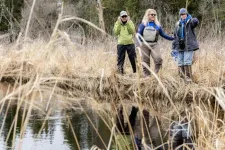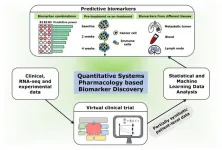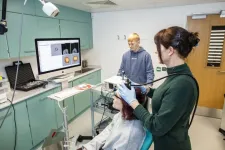(Press-News.org) Just one or two sessions of physical activity at the weekend—a pattern of exercise dubbed ‘weekend warrior’---may be just as likely to lower the risk of cognitive decline, which can often precede dementia, as more frequent sessions, concludes research published online in the British Journal of Sports Medicine.
And it may be more convenient and achievable for busy people as well, suggest the researchers.
It’s important to identify potentially modifiable risk factors for dementia because a 5-year delay in onset might halve its prevalence, they say, adding that nearly all the evidence to date comes from studies in high-income countries.
They therefore drew on two sets of survey data from the Mexico City Prospective Study, the first of which took place between 1998 and 2004, and the second of which took place between 2015 and 2019.
Some 10,033 people (average age 51) completed both surveys and their responses were included in the analysis.
For the first survey, respondents were asked whether they exercised or played sports, and if so, how many times a week, and for how long (in minutes).
Four groups were derived from the responses: the no exercisers; the ‘weekend warriors’ who exercised/played sports once or twice a week; the regularly active who did so three or more times a week; and a combined group comprising weekend warriors and the regularly active.
The Mini Mental State Exam (MMSE) was used to assess cognitive function at the time of the second survey. A score of 22 or less out of 30 was used to define MCI.
In all, 7945 respondents said they didn’t exercise at all; 726 fulfilled the definition of a weekend warrior; 1362 said they exercised several times a week; and 2088 made up the combined group.
During an average monitoring period of 16 years, 2400 cases of MCI were identified. MCI prevalence was 26% among the no exercisers; 14% among the weekend warriors; and 18.5% among the regularly active.
After taking account of potentially influential factors including age, educational attainment, smoking, nightly sleep, diet and alcohol intake, weekend warriors were 25% less likely to develop MCI than the no exercisers, while the regularly active were 11% less likely to do so. Those in the combined group were 16% less likely to do so.
When MCI was defined as an MMSE score of 23 or below, 2856 cases were identified. And MCI prevalence rose to 30% among the no exercisers, 20% among the weekend warriors, and 22% among the regularly active.
Compared with the no exercisers, weekend warriors were 13% less likely to develop MCI, while the regularly active and those in the combined group were 12% less likely to do so. The results were similar for both men and women.
The researchers estimated that, in theory, 13% of cases might be avoided if all middle aged adults exercised at least once or twice a week.
This is an observational study, so no firm conclusions can be drawn about causal factors. And the researchers acknowledge various limitations to their findings. For example, the survey respondents might not have been truly representative of middle aged adults and there were no objective measures of physical activity.
But there are several possible explanations for the seemingly protective effect of exercise on brain health, they explain.
“For example, exercise may increase brain-derived neurotrophic factor concentrations [molecules that support the growth and survival of neurons] and brain plasticity. Physical activity is also associated with greater brain volume, greater executive function, and greater memory,” they write.
“To the best of our knowledge, the present study is the first prospective cohort study to show that the weekend warrior physical activity pattern and the regularly active physical activity pattern are associated with similar reductions in the risk of mild dementia,” they continue.
And they go on to suggest that the findings “have important implications for policy and practice because the weekend warrior physical activity pattern may be a more convenient option for busy people in Latin America and elsewhere.”
END
‘Weekend warrior’ exercise pattern may equal more frequent sessions for lowering cognitive decline risk
Just 1 or 2 sessions of sport and/or exercise likely to benefit brain health. And may be more convenient for busy people, suggest researchers
2024-10-29
ELSE PRESS RELEASES FROM THIS DATE:
Physical activity of any intensity linked to lower risk of death after dementia diagnosis
2024-10-29
Physical activity of any intensity after a diagnosis of dementia is associated with around a 30% lower risk of death, finds research published online in the British Journal of Sports Medicine.
The findings prompt the researchers to conclude that those affected should be encouraged to keep up or start an exercise routine, especially as average life expectancy after a diagnosis of dementia may be only around 4-5 years.
Previously published research has linked physical activity with a lower risk of death in people with the disease, but these studies have focused on a single point in time. So it’s not clear if changes in the amount or intensity of physical ...
Brain changes seen in lifetime cannabis users may not be causal
2024-10-29
Lifetime cannabis use is associated with several changes in brain structure and function in later life, suggests an observational study, but these associations may not be causal, finds a genetic analysis of the same data, published in the open access journal BMJ Mental Health.
Some other unidentified factors may explain the differences found, say the researchers, who nevertheless emphasise that further research is needed to fully understand the effects of heavy use and cannabis potency on the brain.
Cannabis use has increased worldwide following its ...
For the love of suckers: Volunteers contribute to research on key freshwater fishes
2024-10-29
A new paper published today, led by Chicago’s Shedd Aquarium, reveals how volunteers across Illinois, Wisconsin and Michigan enabled researchers to gather seven years of data on the spawning migrations of suckers, an understudied yet essential group of freshwater fishes. Using observations collected by trained members of the public, the collaborative team of researchers have discovered that temperature is the primary trigger for sucker spawning migration, which can help inform conservation strategies in light of a changing climate.
“We believe that conservation of native, non-game fishes ...
Bill and Mary Anne Dingus commit $1M to fund Human Impacts on the Earth Fund at Rice
2024-10-29
Bill Dingus ’81, a Rice University alumnus, and his wife Mary Anne have pledged $1 million to support the university’s Human Impacts on the Earth Fund, dedicated to mitigating and addressing the negative environmental effects caused by human activities on the planet. Additionally, the Dingus family is matching other donors’ contributions to the fund up to $250,000.
The Dingus’ donation enables the launch of the Earth and Planetary Opportunities in Research (EXPLORE) program, a new initiative offered through the Department of Earth, Environmental and Planetary Sciences (EEPS) that allows undergraduates of any major hands-on experience in research projects ...
Most patients can continue GLP-1 anti-obesity drugs before surgery
2024-10-29
Most patients may continue to safely take glucagon-like peptide-1 (GLP-1) receptor agonists as prescribed before undergoing elective surgery and gastrointestinal endoscopies, according to new clinical guidance released today by five surgical and medical societies including the American Society for Metabolic and Bariatric Surgery (ASMBS), American Society of Anesthesiologists (ASA), American Gastroenterological Association (AGA), International Society of Perioperative Care of Patients with Obesity (ISPCOP), and Society of American Gastrointestinal and Endoscopic Surgeons (SAGES).
The guidance, published online in Surgery for Obesity and Related Diseases ...
Computational tool developed to predict immunotherapy outcomes for patients with metastatic breast cancer
2024-10-29
FOR IMMEDIATE RELEASE
Using computational tools, researchers from the Johns Hopkins Kimmel Cancer Center and the Johns Hopkins University School of Medicine have developed a method to assess which patients with metastatic triple-negative breast cancer could benefit from immunotherapy. The work by computational scientists and clinicians was published Oct. 28 in the Proceedings of the National Academy of Sciences.
Immunotherapy is used to try to boost the body’s own immune system to attack cancer cells. However, only some patients respond to treatment, explains lead study author Theinmozhi Arulraj, Ph.D., a postdoctoral fellow at Johns Hopkins: “It’s really important ...
Cerebral embolic protection by geographic region
2024-10-29
About The Study: The PROTECTED transcatheter aortic valve replacement (TAVR) trial could not show that the use of cerebral embolic protection (CEP) had a significant effect on the incidence of periprocedural stroke during TAVR. Although there was no significant interaction by geographic region, this exploratory post hoc analysis suggests a trend toward greater stroke reduction in the U.S. cohort but not in the outside the U.S. cohort. These findings are hypothesis generating, and further research is needed to determine if regional differences in patient characteristics or procedural practices ...
12 new Oriental weevil species discovered using advanced imaging tools
2024-10-29
Jake Lewis, an entomologist in the Environmental Science and Informatics Section at the Okinawa Institute of Science and Technology (OIST), is fascinated by weevils, a diverse group of beetles that includes many species with elephant trunk-like mouthparts (called a rostrum). Weevils provide various ecosystem services such as pollination and decomposition, but some species are serious pests known to decimate crop fields and timber forests.
Using x-ray microtomography, a 3D imaging technique ...
Ultrasound can be used as search and rescue tool for the brain
2024-10-29
Ultrasound, once used almost exclusively to take images of the body, is quickly developing into a targeted therapy that can have a potentially life-changing impact on our brains, according to the authors of a new article.
For decades, health professionals across the world have used ultrasound as a means of monitoring the development of unborn babies and assessing the health of patients’ internal organs.
But writing in the journal PLOS Biology, researchers from Stanford University, the University of Plymouth, and Attune Neurosciences say it has now been demonstrated to offer a non-invasive and precise way of targeting ...
Department of Defense funds study of gene therapy for muscular degeneration
2024-10-29
The U.S. Department of Defense awarded just under $514,000 to an interdisciplinary team of researchers at the U of A to study the efficacy of “self-delivering” gene editors in the treatment of Duchenne Muscular Dystrophy, or DMD.
DMD results from a mutation in the dystrophin gene and is one of the most severe inherited muscular dystrophies, leading to deterioration of the muscle fibers. Presently, there is no cure, but advances in treatment have helped patients live longer, better lives.
Gene therapy designed to ...
LAST 30 PRESS RELEASES:
ASU researchers to lead AAAS panel on water insecurity in the United States
ASU professor Anne Stone to present at AAAS Conference in Phoenix on ancient origins of modern disease
Proposals for exploring viruses and skin as the next experimental quantum frontiers share US$30,000 science award
ASU researchers showcase scalable tech solutions for older adults living alone with cognitive decline at AAAS 2026
Scientists identify smooth regional trends in fruit fly survival strategies
Antipathy toward snakes? Your parents likely talked you into that at an early age
Sylvester Cancer Tip Sheet for Feb. 2026
Online exposure to medical misinformation concentrated among older adults
Telehealth improves access to genetic services for adult survivors of childhood cancers
Outdated mortality benchmarks risk missing early signs of famine and delay recognizing mass starvation
Newly discovered bacterium converts carbon dioxide into chemicals using electricity
Flipping and reversing mini-proteins could improve disease treatment
Scientists reveal major hidden source of atmospheric nitrogen pollution in fragile lake basin
Biochar emerges as a powerful tool for soil carbon neutrality and climate mitigation
Tiny cell messengers show big promise for safer protein and gene delivery
AMS releases statement regarding the decision to rescind EPA’s 2009 Endangerment Finding
Parents’ alcohol and drug use influences their children’s consumption, research shows
Modular assembly of chiral nitrogen-bridged rings achieved by palladium-catalyzed diastereoselective and enantioselective cascade cyclization reactions
Promoting civic engagement
AMS Science Preview: Hurricane slowdown, school snow days
Deforestation in the Amazon raises the surface temperature by 3 °C during the dry season
Model more accurately maps the impact of frost on corn crops
How did humans develop sharp vision? Lab-grown retinas show likely answer
Sour grapes? Taste, experience of sour foods depends on individual consumer
At AAAS, professor Krystal Tsosie argues the future of science must be Indigenous-led
From the lab to the living room: Decoding Parkinson’s patients movements in the real world
Research advances in porous materials, as highlighted in the 2025 Nobel Prize in Chemistry
Sally C. Morton, executive vice president of ASU Knowledge Enterprise, presents a bold and practical framework for moving research from discovery to real-world impact
Biochemical parameters in patients with diabetic nephropathy versus individuals with diabetes alone, non-diabetic nephropathy, and healthy controls
Muscular strength and mortality in women ages 63 to 99
[Press-News.org] ‘Weekend warrior’ exercise pattern may equal more frequent sessions for lowering cognitive decline riskJust 1 or 2 sessions of sport and/or exercise likely to benefit brain health. And may be more convenient for busy people, suggest researchers





